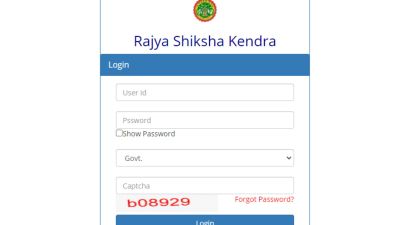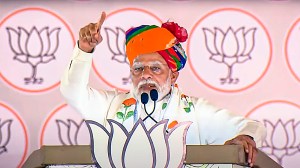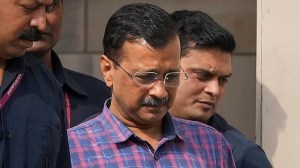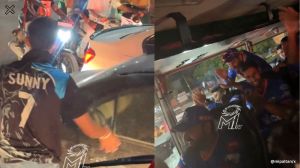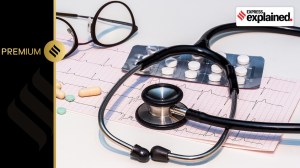- India
- International
To get a sense of covid spread: With a bus, a counter and minimal staff, South Delhi begins aggressive testing
The makeshift testing centre involves a bus where the testing kit is placed and a registration counter outside. A lab technician handles the testing paraphernalia, while another makes reports.
 A testing centre at Sarvodaya Enclave Wednesday. Tashi Tobgyal
A testing centre at Sarvodaya Enclave Wednesday. Tashi Tobgyal
Around 2.30 pm Wednesday, more than 30 people stood in a queue outside a CRPF bus at Sarvodaya Enclave’s gate number 2, some visibly anxious as the line slowly moved forward. The bus is a makeshift laboratory aimed at providing free and fast Covid test results to area residents, with officials saying such mobile testing labs have become crucial in assessing the spread of the virus.
“For the past several days, we have been carrying out mobile tests in many parts of South Delhi. Testing trucks are stationed at vantage points as well as in and around containment zones. We have observed that in many areas, several domestic helps, shopkeepers and people whose jobs involve visiting multiple places reside. In such a case, testing becomes crucial since the data gives an idea of where the infection is spreading. We also carry out surveys to ensure testing vans are placed in such a manner to provide maximum coverage,” said Kapil Chaudhary, South Delhi sub-divisional magistrate.
The makeshift testing centre involves a bus where the testing kit is placed and a registration counter outside. A lab technician handles the testing paraphernalia, while another makes reports. A driver and two CRPF guards are also present. A government doctor oversees the operations. The resident welfare associations of these areas help the SDM arrange the mobile testing facility.
According to officials, patients undergo the faster rapid antigen test instead of the conventional RT-PCR test. An official present at the testing van in Sarvodaya Enclave told The Indian Express that the test results take approximately 15 minutes and have an accuracy of more than 90%.
Persons whose tests have been conducted are asked to stand away from those waiting in line. In case a person tests positive and is symptomatic, he is taken in an ambulance to a designated government isolation facility from the spot itself. If the person testing positive is asymptomatic, he is asked to sign an undertaking that his home is equipped with ample rooms and a separate bathroom, as per ICMR’s home quarantine guidelines. The undertaking is forwarded to the area health unit and an inspection is carried out in the next 24 hours. If the person does not have the required facilities at home, he is taken to an isolation facility, an official said.

Most people in the queue on Wednesday said they had been asked by their employers to get a test done “as a precaution”. “I work in three houses but had not been going anywhere for two months. Fifteen days ago I resumed work, but in one of the houses I returned to, a Covid patient was found. My employer didn’t pay me for those two months and I cannot miss more days of work. So I’m getting my test done to show employers I’m Covid-free,” said Rinku (39), a domestic help in Sarvodaya Enclave.
For some others, the test is a way to put apprehensions to rest. “We were told by our office that a free test will be carried out. I do not have any symptoms but we would not know if we are carriers. If I turn out to be positive later, the entire office will have to shut down. Hence, it is better to get tested at the earliest and not risk other people’s lives,” said Anoop (24), accompanied by three other employees of a private firm.
Meena Khatri (39), a domestic help working in the Sarvodaya Enclave, said: “I stay in a small house with my husband and children and I visit multiple houses for work. If there is a slightest chance that my family is at risk, it is better to know at the earliest… That way, my children will be safe.”
Each mobile van is provided with around 200 testing kits and the kits are usually used in around eight hours, officials said. “We also provide extra kits in case more people turn up… The fact remains that this data collection will give us a better picture of ground reality and we will not have to rely on gross testing figures to assess the situation,” said Chaudhary.
Must Read
Apr 23: Latest News
- 01
- 02
- 03
- 04
- 05











